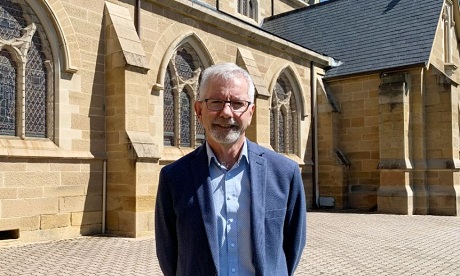A new group called Concerned Catholics Tasmania is calling for a more accountable and transparent Church.
“There’s a culture of unaccountable clericalism where the power of the Archbishop and clergy in general is really exercised with very little consultation and accountability to the people that the church is meant to serve,” Board member Carey McIver (pictured) says.
Concerned Catholics Australia formed as a result of “a lot of frustration”, McIver says.
The group wants to create a church “relevant to the 21st century … a church that is inclusive, listens, invites participation of all people not simply those that are of a clerical order,” he explains.
This would involve greater representation of women, who make up 50 per cent of the congregation, in leadership and governance roles.
“Our late Archbishop Guilford Young advocated this back in the early 60s … and here we are 70 years later and the role of women is still undervalued.” he says.
Another item on the group’s wish list is “active pastoral councils” in parishes to advise priests and better meet the needs of the community.
“There are contentious social issues that we hold a line in the sand on that are not debatable,” he says.
“That’s not, in my humble opinion, a church that reflects how the world has changed in terms of our understanding of science, technology, the universe of which we are a part.”
To illustrate how far the Church is from this reality, McIver offers the example of the fallout from the 2019 appointment of Father Nicholas Rynne.
Rynne was appointed as the parish administrator of the Meander Valley parish. However tensions arose over his more traditional approach.
Concerned parishioners wrote to the archbishop about changes Rynne was ‘forcing’ on them.
After an investigation, Rynne was removed from the parish.
Despite his removal, some say the views of parishioners were not listened to soon enough.
Concerned Catholics’ Australia founding member Paul Collins says the Rynne incident was not unique.
Laity and quite a number of priests in Tasmania have had for some time, he says,
“These concerns centre around the voice of the laity being heard, the kind of issues that the laity are focussed on, and particularly concerns about appointments to parishes.
The church’s future could be “disastrous” unless the leadership was prepared to have “sufficient emotional intelligence” to listen to other people, Collins says.
Hobart’s Vicar General, Father Shammi Perera, says he is “disappointed” about claims of a lack of engagement.
The Church and the archbishop in Tasmania “regularly engages with parishioners and the broader community and will continue to do so.”
Tasmanian parishes are encouraged to run at least one session to share views before Australia’s 2021 Plenary Council, Perera stresses.
However, Collins says there is some concern that while plenty of lay people are going to the Plenary Council many are church employees.
McIver says in addition the response from the Archbishop to his group’s efforts to facilitate the gatherings before the Plenary Council had not “been encouraging”.
Source
